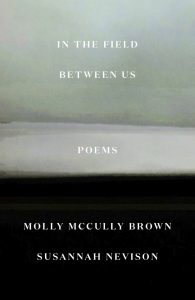Dear M—
Maybe it’s a pronoun problem after all—
our bodies, you, and me, the lot of us
in search of ways to address each other,
when we can’t ever fully turn around
inside this room. When we sleep, of course
we come unraveled: it’s only fair. Awake
we’re always pushing against another
kind of self, who pushes back,
or pulls us down, or makes us stay.
The kind who doesn’t let us go too far,
who strokes our hair, keeps us tame.
When we sleep, I believe we
leave some selves behind. In the morning
they stare back at me across
the room, and though I look away,
they always plead with me:
tell us where we’ve been.
*
Dear S—
Today the doctor’s office called to say he’d see me
in November, and take every photograph at once:
my knees, and hips, and back, to see what’s what.
And I heard: survey the damage; tell your fortune;
reach right in; cast you out. And all my smaller
selves, they hunkered down like children,
tender in their fear, swore that they’d file down
their claws and fall in line, or let me loose
if that was what I wanted. Begged me
to keep them a secret, not to hold them
out there in the light. Years ago they spent
a long time in the theater: fumbling their blocking,
being stretched and prodded, asked to pose,
stitched together, rent apart. There are so many star
charts made in their image, so many maps
of how they move. But then there was this mess
of wild, unwatched years. My hair grew long,
my selves grew wedded to their unseen galaxy.
They want no cartograph, no telescope;
they want neither to know or to be known.
I have been asking for an answer, a relief map.
I have begged to be found out. Now
some maker readies the camera, readies
the compass, readies the knife, and all of me
rallies to pull the curtains closed, to cover my face.
*
Dear M—
There’s no going back,
no clearing to be found,
no curling ring of grass where
an animal, bedded down,
cries out and breaks me open
because she’s calling back
to me, wherever I still wait,
from wherever it is we first
learned the body’s another door
the world slams shut each time
we think to drag ourselves out
of the line of sight, beyond the scope
of whatever hand would yoke us
to each other, would have us
bent and humbled, poor machines,
poor beasts, whose tongues learn
first to cry and then to speak,
who can’t go home, when where
we’re from is already gone, already
burning down, graven inside us
like every ancient tree,
so we always know
who we belong to, where we
belong, where there’s no going
back, or getting lost or found—
*
Dear S—
We are rewound: grow smaller and more animal,
come back unstitched, the hands inside of us rise up
into their sleeves, the knives are sheathed, the needle
punctures weave together perfect, blank, then absent.
Our tendons tighten down, our bones go back to bowing,
we curl, some hoof returns, the bodies that we know
revert to fictions from a place we didn’t go.
And where we are it’s snowing,
and we’re sheltered the way wild, loved things are when
they are new: a nest of winter grass, a little down,
some hollow where the weather strains to reach. Say that
we’ve never been afraid, we’ve never howled, we’ve never
been in pain. There’s still a storm outside, there’s still some
larger thing with teeth, there’s still the day something will
nose us to get up and walk, then run, and when we can’t
will leave without us, fearing yet another winter or a gun.
*
Dear Maker
I’d say the problem isn’t the story
or that I’m in it, or that I resist the ways
I’m drawn. It’s always been gravity and matter
and the planet’s relentless pull.
I resent the game. I don’t want a seat at the table.
I don’t want a table either if it means everything
here is pinned down by its own weight. I’d say
the problem is I haven’t been sold on the ground
beneath me. Nobody told me the view
is much better from space. When the planet becomes
just another raised fist in the distance, I don’t mind.
Though I’m poorly drawn, I still raise mine.
__________________________________

From In the Field Between Us by Molly McCully Brown and Susannah Nevison. Copyright © 2020 by Molly McCully Brown and Susannah Nevison. Reprinted by permission of Persea Books, Inc. (New York).



